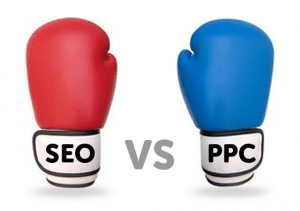During a recent comment thread on Facebook by Steve Floyd, the subject of SEOs (Search Engine Optimization pros or “search engine optimizers”) and SEMs (Search Engine Marketers or “Pay Per Click professionals”) came up. During this heated discussion, I think there was only one thing that many tended to agree on: SEOs and SEMs are very different.
How? It’s the way SEOs and Search Engine Marketers work. SEMs tend to be very willing to share “trade secrets” with each other, as they are navigating the ever-so-confusing waters of Google AdWords, Bing Advertising Intelligence, Facebook advertising, and Doubleclick. Throw in retargeting and it’s even more confusing and challenging, with everything from policies and technology changing constantly to new product offerings. If you’re in the search engine marketing industry, then you’ll know that even competitors (SEM agencies competing with other SEM agencies) will constantly share new information with each other. After all, you’re spending your client’s money, and at some point that client might be your client.
As one of the founders of the Dallas Fort Worth Search Engine Marketing Association (which includes both SEO and SEM, by the way), I see a lot of SEMs willing to share great industry information with each other.
In the SEO industry, however, it’s more “cut throat” and extremely competitive. It is completely different. Like night and day. Or like Black Hat versus White Hat. SEOs tend to be the opposite of SEMs, where they don’t tend to share “trade secrets” with each other very often. These “trade secrets” are always under strict confidence, and even when there are situations where really great information is shared, it even tends to be shared under a strict NDA. If you’re one of those SEOs who have attended one of DK’s amazing conference get-togethers, then you know what I mean.
SEOs deal with organic or “natural” search engine rankings, among other things (yes, we do a lot of other stuff other than link building and optimizing web pages). The “rules” of SEO are constantly changing, and what works now to get better search engine rankings (such as a certain type of link from one type of web site) may not work in the future.
In fact, if you’re an SEO and are actively doing SEO, then you will notice things–like the fact that Google, for example ALWAYS will tend to roll out an organic search algorithm update before they announce that there is an update. I remember the EMD (Exact Match Domain) update that Google did a while back. I was literally on the phone with a client at 8:00am on a Saturday morning talking about a traffic drop and why it happened–and Google announced that “update” on the following Monday. By Monday, I had already been working on changes to that client’s link profile that would counter-act what I was seeing already in the search results.
SEOs who are very good at what they do tend to not share “trade secrets” with others. If you know me, though, you can talk to me in person and I will give you probably more information than any good SEO in this industry. But that’s because I tend to share more than a lot of others. That’s just the way I am. But I can tell you that if there is something I run across because of my hard work and dedication as an SEO, I won’t share it with others–even some of the peers I work with. It could be thought of as job security–or just that the “trade secret” is too good to let someone else know about it. After all, if that “trade secret” ends up on some SEO message board somewhere, on Google+, or if it’s tweeted on Twitter, then most likely the “loophole” won’t last that long.
SEO isn’t just about loopholes, though. It’s a lot more than that. Google, by nature, is a search engine–and they will do everything that they can to stop the “loopholes” in their organic search engine’s algorithm. I applaud them for that. It just keeps us real SEOs on our toes. That’s what I love about this industry.
